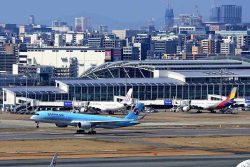16:00 JST, February 25, 2023
The Singapore economy grew slightly slower than expected in 2022, and has entered this year with muted expectations as a global slowdown looms.
The overall growth for 2022 was 3.6%, a tad below the earlier estimate of 3.8%, said the Ministry of Trade and Industry (MTI) on Feb. 13.
While the faster-than-expected relaxation of China’s border restrictions is likely to help aviation- and tourism-related sectors, a broader slowdown in the global economy will limit the pace of expansion.
For now, MTI is keeping its growth forecast for 2023 within a broad range of 0.5% to 2.5%.
In the fourth quarter of 2022, the economy expanded by 2.1% from a year ago, lower than MTI’s earlier projection of 2.2% and the 2.3% forecast by analysts in a Bloomberg poll.
On a quarter-on-quarter seasonally adjusted basis, the economy grew just 0.1% in the fourth quarter.
However, MTI raised its estimate for 2021 growth to 8.9% from 7.6% to account for data updates and revisions from various sources, including the annual sectoral surveys carried out last year.
While gross domestic product (GDP) growth in 2022 was mainly driven by the wholesale trade, manufacturing and other services, this year will see different drivers.
The opening of global air travel will mean that the air transport and aerospace segment could do well. Domestic-oriented sectors such as accommodation, entertainment and recreation could also contribute more.
“Since the last media briefing in November, Singapore’s external demand outlook for 2023 has improved slightly,” said Mr. Gabriel Lim, Permanent Secretary for Trade and Industry.
“In particular, growth in China is projected to pick up in tandem with the faster-than-expected easing of its COVID-19 restrictions,” he said.
China’s full economic reopening has, in turn, led to improvements in the growth outlook of Asian economies.
However, the outlook for the United States and eurozone economies remains weak amid tighter financial conditions, Mr. Lim added.
“At the same time, uncertainties in the global economy remain,” he said.
These include the impact of higher interest rates, as well as the risk that the war in Ukraine and geopolitical tensions among major global powers will escalate.
Hence, MTI said, the growth outlook for other outward-oriented sectors remains weak.
For instance, the semiconductors segment of the electronics cluster is expected to be hit by weaker global semiconductor demand, while the precision engineering cluster is projected to be weighed down by a cutback in capital spending by semiconductor manufacturers.
At the same time, growth in the wholesale trade, water transport, and finance and insurance sectors will be dampened by the slowdown in major external economies.
Barclays senior regional economist Brian Tan said that despite the mixed picture, the bank is relatively more optimistic than the MTI. “While we expect manufacturing activity to remain weak into this year, the services sector recovery, driven by the revival in international travel, will likely provide a significant offset,” he said.
Barclays maintained its 2023 GDP growth forecast of 2.2% — well above the 1.5% midpoint of MTI’s forecast range.
In 2022, the manufacturing sector grew by 2.5%, slower than the 13.3% growth in 2021. Within the sector, all clusters expanded, except for the chemicals and biomedical manufacturing clusters.
The construction sector posted a growth of 6.7%, down from the 20.5% expansion in 2021 amid both public-sector and private-sector construction works.
The services-producing industries expanded by 4.8%, easing from the 7.6% expansion in 2021. Growth was mainly driven by the wholesale trade, other services, and information and communications sectors.
Separately, on Feb. 13, Enterprise Singapore said non-oil domestic exports (Nodx) rose by just 3% in 2022, sharply down from the 12.1% gain in 2021. It also maintained its 2023 forecast for Nodx of no growth or a contraction of as much as 2%.
As the growth momentum slows, inflation is no longer accelerating.
Headline inflation, which includes price changes in all items, rose to 6.6% year on year in the fourth quarter, after peaking at 7.3% in the third quarter, according to the Economic Survey of Singapore 2022 report.
On a quarter-on-quarter seasonally adjusted basis, headline inflation came in at 0.9%, down from the 1.8% in the third quarter.
Mr. Edward Robinson, deputy managing director of economic policy and chief economist at the Monetary Authority of Singapore (MAS), said at Monday’s briefing that MAS’ current policy stance is appropriate and will continue to slow the inflation momentum.
MAS maintains that for 2023 as a whole, factoring in the goods and services tax increase, headline inflation will average 5.5% to 6.5%.
Top Articles in World
-

Israeli Ambassador to Japan Speaks about Japan’s Role in the Reconstruction of Gaza
-

Videos Plagiarized, Reposted with False Subtitles Claiming ‘Ryukyu Belongs to China’; Anti-China False Information Also Posted in Japan
-

Nepal Bus Crash Kills 19 People, Injures 25 Including One Japanese National
-

South Korea Tightens Rules on Foreigners Buying Homes in Seoul Metro Area
-

Ukrainian Ambassador Closely Watching Japan’s Revision of Defense Export Rules, Hopes for Future Arms Support
JN ACCESS RANKING
-

Producer Behind Pop Group XG Arrested for Cocaine Possession
-

Japan PM Takaichi’s Cabinet Resigns en Masse
-

Man Infected with Measles Reportedly Dined at Restaurant in Tokyo Station
-

Israeli Ambassador to Japan Speaks about Japan’s Role in the Reconstruction of Gaza
-

Videos Plagiarized, Reposted with False Subtitles Claiming ‘Ryukyu Belongs to China’; Anti-China False Information Also Posted in Japan
























